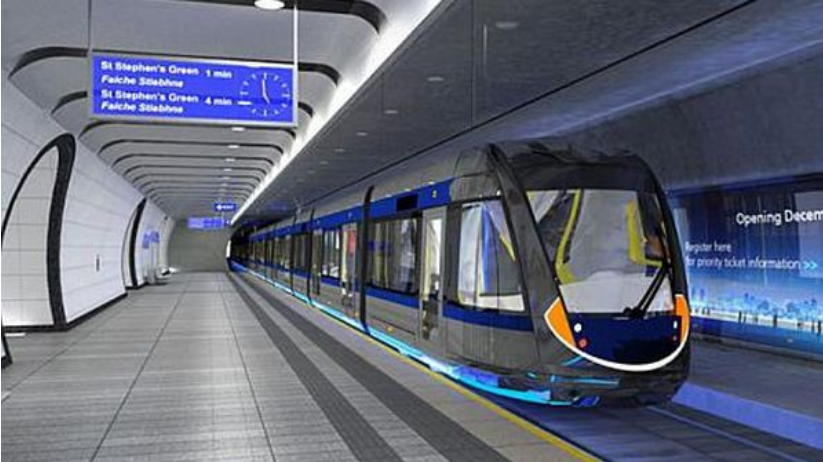What can a person achieve in 34 years? Well, one could be born, attend school, move to college, graduate, start work, get married, start a family, and maybe even buy a house if we’re prepared to stretch the limits of our imagination. What can Transport Infrastructure Ireland achieve in that time? Vanishingly little, it turns out.
The first solid proposal for a metro line in Dublin emerged back in November 2001, when the Spire had not yet been finished, the Euro was not yet in circulation, and the author of this piece was all of a week old. Initially proposed by the Dublin Transportation Office, this shining new metro service was to consist of three lines: North-South including Dublin Airport, Tallaght West to the City Centre, and a third connecting line between the two. It was an ambitious project, but one that was much needed. Several years of deliberation and several route changes later, what became known as Metro North was at long last granted planning permission in October 2011.
An indefinite delay to the project was announced little more than a month later, in November 2011.
A decade of meetings, proposals, amendments, arguments, and planning all came to naught. Think of what other countries have achieved in a ten-year period. The Channel Tunnel between France and Britain took a mere six years to complete. The Palm Islands in Dubai also took six years. Strikingly, construction on the original Skytrain line in Vancouver in Canada took just three years.
Then, it was announced in 2015 that Metro North was to be relaunched, with the planned opening date being in 2027. Of course, this plan did not come to fruition either, and in 2018 it was announced that Metro North was to be rebranded as MetroLink, with a scaled back route. In 2021, the government admitted that the 2027 deadline was no longer feasible and have since been reluctant to put out a more concrete date than sometime early in the next decade, maybe 2035.
“There is an unwillingness in Ireland to strive for any kind of long-term achievement”
What does this 34-year long dilly-dallying session say about us as a country? How is it that other countries can propose, plan, construct, and open all manners of infrastructure and of public transport services in a shorter timeframe than we can get a plan from stage 1 to stage 2 of development? There is an unwillingness in Ireland to strive for any kind of long-term achievement, to imagine that things could be better.
Major opposition to Metrolink has come from politicians and interest groups who are worried about potential disruption to the Green Line Luas. Others worry about the extortionate cost of the venture, ranging from €9.5 billion (best case scenario) to €23 billion (absolute worst case scenario as revealed by Leo Varadkar). In reality, these concerns should fall to the wayside compared to the benefits that the metro, even in its newer, more scaled-back format, would bring. Not only would the presence of a metro help to alleviate congestion on Dublin’s roads and the Luas, it would also significantly increase the number of people using public transport daily. If Ireland is serious about tackling climate change and moving away from a car-dominated world, then our first and more essential step is improving the quality, quantity, and efficiency of our public transport.
I have yet to meet a fellow traveller on the way to or from Dublin Airport who, when asked, does not think the airport would benefit from a rail link. Dublin is the only major European capital city without direct rail access to its airport, relying instead on bus services that trundle slowly towards the city centre every half hour or so. Ireland’s inability, and indeed unwillingness to devote the time, money, and resources to a project that would benefit not only the lives of commuters, but even tourists, is disappointing and yet somehow not surprising.
How often have we seen interesting, dynamic initiatives shelved for an easier option? One only has to think back to the Gluas (Galway Luas), Galway ring road or Donegal rail services proposals that never got full support from the Government and never came to fruition. There will always be reasons not to do something, but when those reasons are consistently given more weight than the reasons to pursue an idea, nothing of worth will be accomplished in a society. Time after time sub-par infrastructures and short-term solutions are given the green light whilst ambitious and long-term projects are shelved, tossed aside, or dismissed as unnecessary.
As Ireland’s younger generation grows up and reflects on the broken promises of our youth, we must not fall into the same old trap of believing that just because something is hard, it means that it is not worth doing. Often, things are hard precisely because they are worth doing.We must not believe that better options are out of reach, especially something as mundane and as simple as a rail route to the airport. Isn’t it about time that we stop making excuses, and begin to catch up with the rest of Europe, and build a more sustainable and more accessible future?






